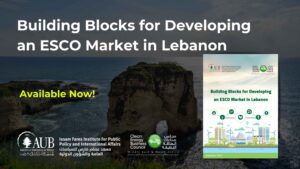CEBC AND IFI – AUB POLICY INSTITUTE CO-AUTHOR A WHITE PAPER TITLED “BUILDING BLOCKS FOR DEVELOPING AN ESCO MARKET IN LEBANON”
In collaboration with Issam Fares Institute for Public Policy and International Affairs of the American University of Beirut, the CEBC published a white paper titled “ Building Blocks for Developing an ESCO Market in Lebanon”.
Global electricity demand has been rising steadily, which has resulted in an increase in fossil fuel generation. The International Energy Agency (IEA) reports a 5% increase in electricity demand in 2021, primarily met by fossil fuels (IEA, 2021). The increase in greenhouse gas (GHG) emissions in recent years triggered many countries to adopt policies and strategies that reduce energy wastage and improve energy efficiency on both the demand and supply sides. Energy demand is only set to increase even further, due to population and economic growth. In fact, global energy demand is forecast to increase 47% in the next 30 years (Gordon et al., 2021). Several MENA states (e.g., Saudi Arabia) have some of the highest energy consumption rates per GDP globally (CEBC, 2021); in part due to high energy subsidies. Energy efficiency is central to tackling climate change and to meeting climate action goals. Energy efficiency is low-hanging fruit for the MENA region, especially since it is one of the alternatives available to reducing consumption and GHG emissions in existing buildings. With climate action rising to the top of global policymaker’s agendas and the projected rise in global energy demand, it is essential to adopt more sustainable practices and energy efficiency. Energy practitioners have often stated that energy is desired not for its own sake, but for the services that it produces, like water heating, cooling, lighting, and cooking. An Energy Service Company (ESCO) is a company that provides comprehensive energy solutions to its customers, which includes but is not limited to auditing, redesigning, and implementing changes that enable the customer to consume less energy while still performing the same tasks. The reduction in energy consumption rates results in energy-related cost reductions, for which clients often employ ESCOs for their services, even if they are not driven to be more sustainable per se. Additionally, ESCOs also provide energy infrastructure outsourcing, energy supply, financing, and risk management (Badi, 2021). Performance contracting is what distinguishes ESCOs from standard energy companies. In some cases, ESCO projects do not provide a return on investments, rather, ESCO pays the Capital Expenditure (CAPEX) difference, thus providing clients with an energy and cost-saving mechanism (Boza-Kiss et al., 2015). In other cases, ESCOs provide a return on investment through guaranteed savings arrangements.
This paper aims to set the basis for the development of an ESCO market in Lebanon in the coming years. This is done by identifying building blocks and analyzing best practices and trends, both at the international level, and specifically the MENA region, focusing on the UAE, Saudi Arabia, Morocco, and Oman. It also dives into the nascent ESCO market in Lebanon, through the dissection of the current legal and institutional frameworks, before proposing concrete recommendations at the policy, technical, and financial levels.
Download and start reading




